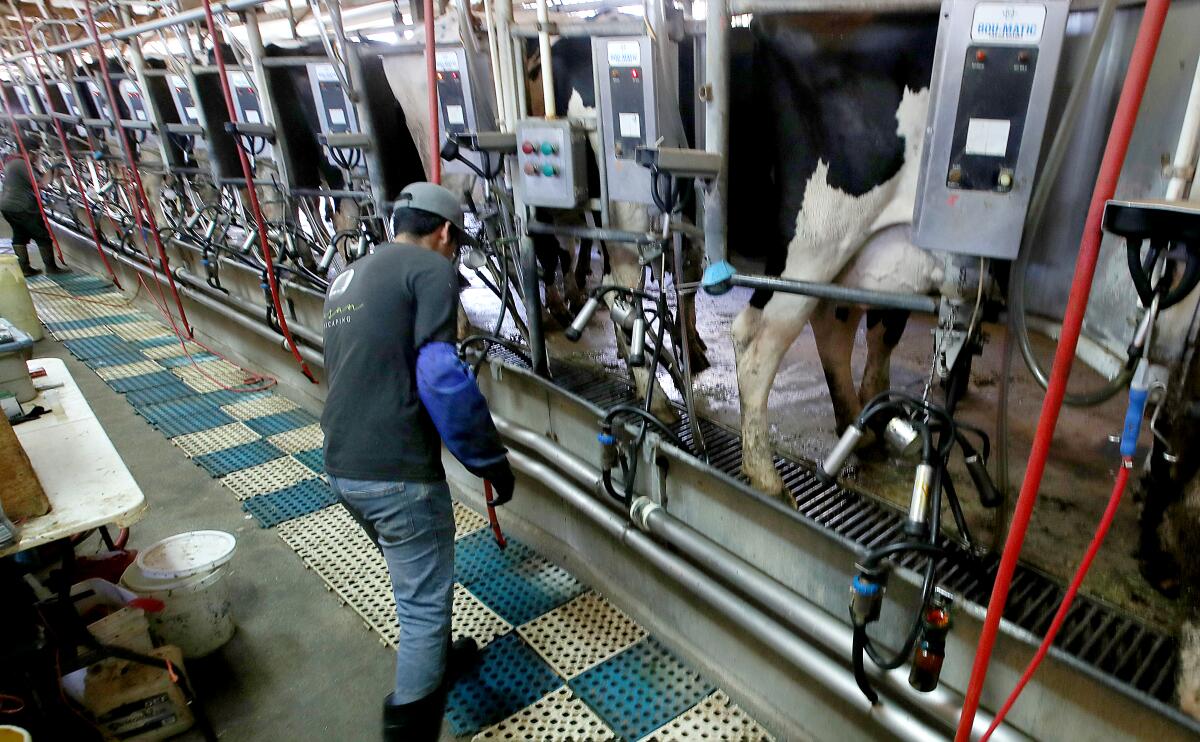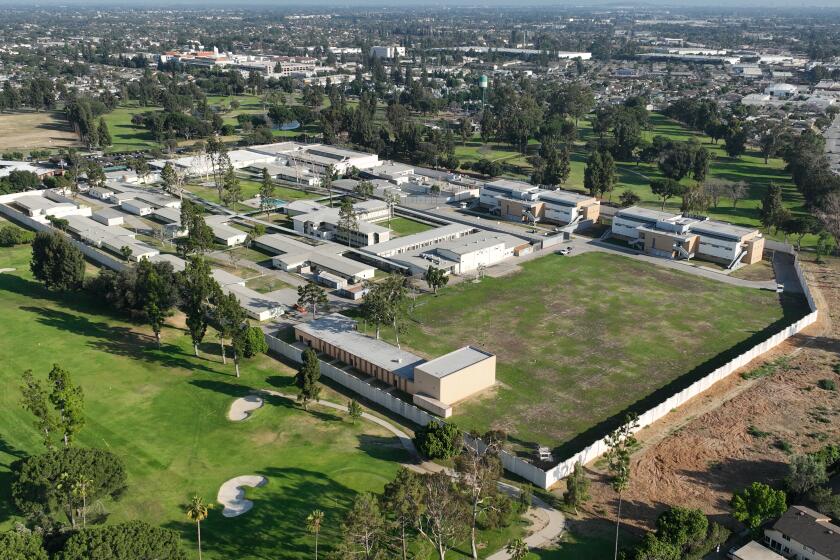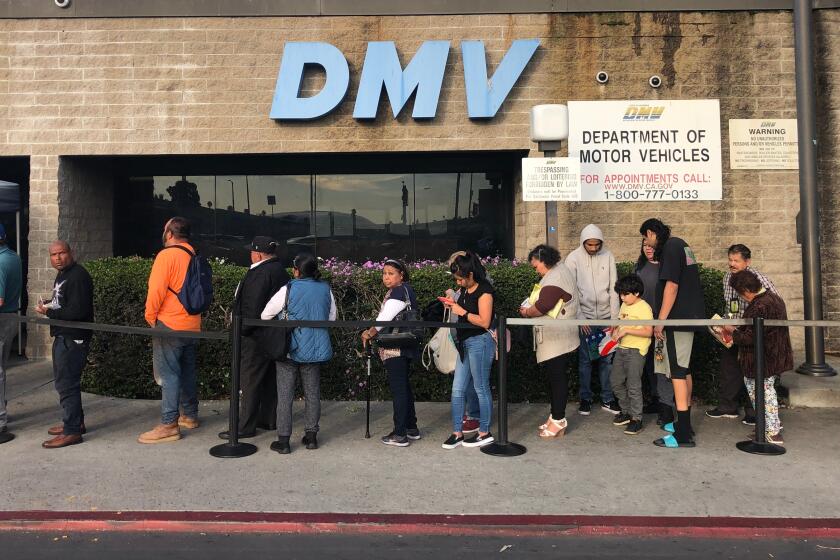As bird flu spreads, so do fears of a ‘nightmare scenario’

- Share via
Good morning. Here’s what you need to know to start your day.
- What to know about the latest bird flu developments.
- ‘Everybody around here lost something’: How teens are coping after the Eaton fire.
- 16 of the best cheese shops in SoCal for saying ‘I love you.’
- And here’s today’s e-newspaper.
You're reading the Essential California newsletter
The most important California stories and recommendations in your inbox every morning.
You may occasionally receive promotional content from the Los Angeles Times.
Bird flu hits Nevada as its effects remain visible at grocery stores
Susanne Rust hated to say it, but she did:
“I think the H5N1 bird flu outbreak is going to continue to pester us as we move into 2025,” The Times’ environmental health reporter told me in December as I gathered insights from our newsroom to understand what stories they’d be following into the new year.
A trip to the supermarket will confirm that bird flu is indeed pestering us.
Millions of chickens have been killed to limit transmission of the virus. That’s wreaking havoc on the nation’s supply of eggs, as many of you reading this know first-hand (the TikTok videos are wild).

The latest development, Susanne reported this week: a deadly strain of bird flu is infecting dairy cows in neighboring Nevada. Dubbed D1.1, this version of the virus killed a person in Louisiana, severely sickened a teen in Canada and has been causing major die-offs of wild birds in a few eastern states.
“Finding D1.1 in dairy cows caught investigators off-guard, but it is also just the latest surprise as the H5N1 bird flu continues to flummox researchers and public health officials,” she wrote. “It’s a stark reminder that this virus does not behave like a ‘typical’ flu virus.”
John Korslund, a former USDA scientist, didn’t mince words as he explained the current situation to Susanne via email.
“This is truly a ‘s— show’ unfolding into a nightmare scenario,” Korslund wrote. “We have no idea how widespread this version of the virus already is in cattle herds. Every time poultry flocks break [with virus] we’ll need to investigate cattle contacts [which are many] as well as wild bird and other poultry contacts.”
Researchers are facing many unanswered questions as they try to understand the virus’ impacts, including how it could affect the dairy industry, other livestock animals and humans that are in close contact with those animals, and the likelihood of more “spillover events” from wild birds into cattle.

How bad is it?
The U.S. Centers for Disease Control has recorded 67 human infections and one death through January. More than half of human cases were in California and all but two were dairy workers.
Although there are no confirmed person-to-person infections so far, Susanne previously reported on research that indicates the strain currently affecting dairy cows is one mutation away from becoming easily transmitted between humans.
Data from the U.S. Department of Agriculture show 32 new confirmed cases of H5N1 infections among cows at dairy facilities in the state last month and more than 736 cases in total during the outbreak. That represents nearly 77% of cases nationwide.
More than 100 commercial chicken farms in California have experienced infections, affecting more than 23 million birds, according to USDA data through Feb. 3. Nationwide, nearly 30 million birds have been affected.
In December, Gov. Gavin Newsom declared a state of emergency amid rising cases, “to ensure government agencies have the resources and flexibility they need to respond quickly to this outbreak.”

How is the federal government responding?
That’s mostly TBD.
Shortly after retaking office, President Trump shut down the Biden-era White House Office of Pandemic Preparedness and ordered federal health agencies to “pause” all public communication. That included halting studies CDC researchers planned to release pertaining to bird flu.
Infectious-disease experts are concerned that the administration’s actions will hamper the government’s ability to provide timely information about the spread of the virus. Susanne spoke with some who worried about economic and social isolation if the virus continues its spread.
“Other nations may begin to question the health and safety of exported agricultural products, such as dairy, livestock, poultry and meat, as well the health of Americans who want to travel internationally,” Susanne explained.
You can read her latest reporting here.
Today’s top stories

California’s attorney general has become the face of California’s legal resistance to the second Trump administration
- Atty. Gen. Rob Bonta vowed to defend state educators and their immigrant and LGBTQ+ students against Trump administration threats, saying California laws requiring inclusive school environments remain intact and that his office will go to bat for them.
- He recently joined other state attorneys general in suing the administration over a freeze on federal funding and an executive order seeking to end birthright citizenship.
- He sent a letter to Children’s Hospital Los Angeles warning that withholding services for transgender patients could violate state law.
- He also said he will not join the race to replace Gov. Gavin Newsom in 2026 and will instead seek reelection for attorney general. The role is now “more important than ever” as President Trump begins his second term.
Trump’s tariffs could reshape one of retail’s most booming sectors: fast fashion
- Hefty taxes on imports from the U.S.’ biggest trading partners have been averted at least temporarily by Mexico and Canada, but not China, which had an additional 10% tariff imposed on its goods this week.
- Included in Trump’s China gambit was a decision to close a decades-old trade loophole that had allowed lower-cost items to skirt existing tariffs.
- That could change the landscape of online shopping, particularly for the Chinese e-commerce companies behind wildly successful sites such as Shein and Temu.
What else is going on
- A self-proclaimed nightlife promoter who dumped two women at L.A. hospitals after they overdosed at his home was convicted of two counts of murder and seven counts of sexual assault.
- Trump is poised to diminish the education department; the fate of financial aid and equity grants are uncertain.
- While the Biden administration criticized Salvadoran President Nayib Bukele’s strong-armed governing style, the Trump administration sees him as its new best friend in Latin America.
- LAUSD sets aside $2.2 billion to rebuild burned campuses and make schools more resilient.
- Trump’s declaration that the U.S. wants to “take over” the war-ravaged Gaza Strip and permanently resettle Palestinians living there hits a wall of opposition.
- A lawsuit accuses the University of California of illegally giving admissions preference to Black and Latino students.
- China, gaining ground in Latin America, spies an opportunity in Trump’s chaotic foreign policy.
- A lawsuit accuses a gynecologist at a California women’s prison of abusing patients for years.
- Summer online reservations for Yosemite National Park have been postponed indefinitely.
- Scientists search for answers after a gray whale washes ashore in L.A., bitten and underweight.
- Breaking down the matchups, key players and the winner of the 2025 Super Bowl between the Kansas City Chiefs and the Philadelphia Eagles.
Get unlimited access to the Los Angeles Times. Subscribe here.
Commentary and opinions
- Did business leaders do enough to head off Trump’s tariff saber-rattling? Obviously not, writes columnist Michael Hiltzik.
- Luka Doncic joins Lakers with bad baggage … and that’s a good thing, columnist Bill Plaschke writes.
- China’s DeepSeek caused some panic for tech stocks. But it is actually poised to expand use of artificial intelligence in the U.S. and beyond, guest columnist Victor Menaldo writes.
- Trump wants to extend the 2017 tax cuts. Guest columnist William Gale writes about how that would affect regular Americans.
This morning’s must reads

‘Everybody around here lost something’: How teens are coping after the Eaton fire. As the community starts to grapple with how to rebuild, we wanted to hear from young people. Youth, ranging from 11 to 18, shared with us how their lives have changed, what they are worried about and what’s keeping them optimistic about the future.
Other must reads
- What’s that smell? Readers share the scents that remind them of L.A.
- CNN finds itself at a digital crossroads after years of turmoil.
- It’s time to drop tomato and onion from your guacamole, America, Times food editor Daniel Hernandez writes.
How can we make this newsletter more useful? Send comments to essentialcalifornia@latimes.com.
For your downtime
Going out
- 🧀16 of the best cheese shops in SoCal for saying ‘I love you.’
- 🥁Drummer Justin Hurwitz keeps ‘Whiplash’ alive with ‘nerve-racking’ concert series coming to the Saban Theatre in Beverly Hills this weekend.
Staying in
- 📺Laverne Cox and George Wallace offer a loving vision of trans families in ‘Clean Slate’ — streaming now on Prime Video.
- 🥑 Here’s a recipe for Mexico City-Style Spicy Guacamole.
- ✏️ Get our free daily crossword puzzle, sudoku, word search and arcade games.
A question for you: What’s a piece of advice that changed your life?
Mayra Fernández de Schäfer writes: “As a teenager, growing up in Guatemala, I used to have an opinion on almost everything happening in the neighborhood. Once, as I pondered over someone’s ongoing crisis with a relative, my mother, almost casually, said: ‘No hay que sudar calenturas ajenas’ (you don’t have to sweat other people’s fevers), which taught me not to judge based on assumptions and also to mind my own business.”
Email us at essentialcalifornia@latimes.com, and your response might appear in the newsletter this week.
And finally ... from our archives

On Feb. 6, 1993, tennis champion Arthur Ashe — the only Black man to win Wimbledon — died of pneumonia, a complication of AIDS. He said he had contracted the disease from an unscreened blood transfusion during his second open-heart surgery in 1983. Former Times sports writer Steve Springer wrote about Ashe’s wins on and off the court.
Have a great day, from the Essential California team
Ryan Fonseca, reporter
Defne Karabatur, fellow
Andrew Campa, Sunday reporter
Kevinisha Walker, multiplatform editor
Hunter Clauss, multiplatform editor
Christian Orozco, assistant editor
Stephanie Chavez, deputy metro editor
Karim Doumar, head of newsletters
Check our top stories, topics and the latest articles on latimes.com.
Sign up for Essential California
The most important California stories and recommendations in your inbox every morning.
You may occasionally receive promotional content from the Los Angeles Times.




